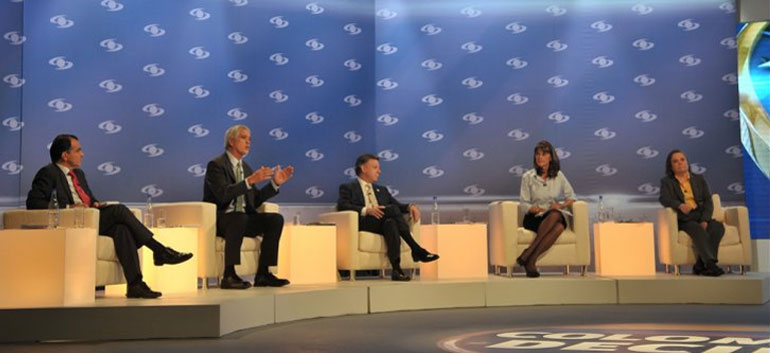Following months of campaigning in what has been called Colombia’s “dirtiest” election in recent history, television network Caracol imposed a ban on personal attacks during Friday’s TV debate, the last before Sunday’s election.
| Colombia’s 2014 elections | ||||||||||||||||
Candidate profiles
Full election coverageElection polls |
The strictly imposed rule caused discontent with all candidates but President Juan Manuel Santos after moderator Luis Carlos Velez intervened each time candidates tried to criticize policy proposals or general behavior.
The rule was imposed after the last weeks of the elections were marred by scandals in the campaigns of Santos and Oscar Ivan Zuluaga, the candidate endorsed by Santos’ main political rival, former President Alvaro Uribe.
Velez told viewers the rule was imposed so candidates would get the opportunity to expose their policy proposals. However, as Velez strictly imposed the rule, all candidates but Santos demanded the rules be imposed less strictly.
Commercial break protest
“We can not talk about what is going on,” Peñalosa was quoted as saying by newspaper El Tiempo. The centrist candidate was supported by Zuluaga who claimed the candidates were “tied down.”
Conservative Party candidate Marta Lucia Ramirez threatened to abandon the debate unless the candidates were allowed to criticize ongoing policies executed by the president or mishaps by her opponents.
However, Velez proved not impressed and — as the commercial break came to a close — called on all candidates to return to their seats and the debate continued.
The candidates were forced to stick to a limited number of topics and — unlike in previous public performances — refrained from personally attacking their opponents.
Candidates’ main talking points
|
All candidates were asked to stick to election proposals regarding ongoing peace talks with rebel group FARC, relations with neighbor Venezuela, the economy, education, public safety, the fight against corruption, and the tone in the election campaigns.
Peace talks
As expected, the candidate most critical of ongoing peace talks with the FARC, responsible for thousands of deaths in Colombia’s 50-year-old conflict, was Zuluaga, who accused the FARC of being Colombia’s largest drug cartel. The candidate said to only continue the talks if the FARC agree to a permanent unilateral ceasefire.
Santos, who began the talks in 2012, said that “voting for Santos is voting for peace.”
Peñalosa protested and claimed that it would be false to claim that “only with President Santos you can achieve peace talks that result in deals.” Instead, he said that “urban politicking” by traditional political powerhouses should also “demobilize.”
Lopez instead called for a bilateral ceasefire, claiming that “negotiating in the middle of a war has generated crises.”
Ramirez said that a long-lasting peace was only possible with a “strong state” and demanded the FARC immediately end laying landmines and recruiting minors.
Corruption
Ramirez, who has increasingly positioned herself as an anti-corruption candidate, called on a governmental “Search Bloc” against the corrupt. This search bloc already exists as part of Santos’ “Anti-Corruption Statute.”
Santos — who has been criticized for ongoing corruption practices in government — reiterated Ramirez’ already executed proposal and stressed the need to curb tax evasion instead.
Zuluaga called on increased authority for civilian corruption watchdogs.
Clara Lopez denounced Santos’ administration, claiming that public funds granted in return for political favors has further diminished budgets for education and health care.
Peñalosa said Colombia’s corrupted political system and cronyism costs $6 billion a year and should be the focal point of anti-corruption efforts.
Education
Santos said his government had already introduced student loans and grants to increase access to higher education.
Peñalosa reminded the president that his administration also failed to reform higher education which has seen a massive increase of students without a similar increase in budget.
Zuluaga promised measures to secure that 9 million Colombians could enter higher education.
Lopez stressed the necessity to provide free higher education to promote academic inclusion of Colombians without the necessary economic resources to study.
Ramirez also wants to provide free higher education for the lower classes.
Public safety
Santos stressed how his government has dealt major blows to guerrilla and drug trafficking organizations and vowed to increase efforts to combat cyber-crime.
Peñalosa also stressed the necessity to increase efforts to curb cybercrime. The Green Alliance candidate also urged the construction of more prisons to fight overcrowding in the penitentiary system.
Zuluaga said he would restart the “Security Councils,” public performances held weekly by former President Alvaro Uribe. According to Zuluaga, these meetings would recover communication between citizens and the state.
Ramirez said she was far from satisfied with Colombia’s current public safety situation and accused Santos of not giving the issue enough attention. The conservative called for more intelligence efforts to prevent crime.
Lopez called for a holistic approach consisting of the creating of opportunities for vulnerable youth while securing offenders receive adequate punishment.


